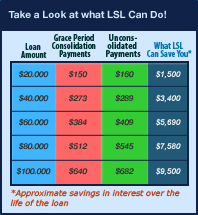 |
For graduates lugging around thousands of dollars in student debt, the prospect of financial freedom is enough to make them do just about anything, including volunteer their time for the good of others. By participating in volunteer loan forgiveness programs, students can have a portion of their debts forgiven after performing a designated amount of public service.
Among the volunteer organizations offering a debt repayment option are the AmeriCorps, the Peace Corps, the military, and various law schools.
The AmeriCorps, which is the largest program of its kind, has more than 75,000 volunteer positions available. The organization requires a one-year commitment, pays volunteers a salary of $7,400, and awards $4,725 in education money upon completion of the commitment. The funds can be used to pay for tuition or reduce existing student debt and can be received for up to two years. Loans can also be deferred for the length of the volunteer's commitment.
However, if it's not possible to commit to a full year, graduates can serve anywhere from a minimum of 300 hours to a maximum of 1700 hours. In a case where a volunteer serves less than full-time, the education award is prorated. Volunteers may wait up to seven years to use the award after their period of service.
However, it is important to note that with only about $616 a month provided for living expenses, this option might not be the best for graduates with other financial responsibilities such as car or house payments.
Volunteers in Service to America (VISTA) is one part of the AmeriCorps program. An organization committed to ending poverty, homelessness, and illiteracy across the nation, VISTA is a big supporter of community development. Founded in 1965, the organization has placed over 120,000 volunteers in national service positions.
"VISTAs come from all walks of life and work among the poor, serving in rural and urban areas across the country," a statement on the organization's website reads. "VISTAs work with community based non-profit agencies where they share skills and experience to address issues such as homelessness, illiteracy, economic development, and neighborhood revitalization."
Since VISTA is affiliated with the AmeriCorps, volunteers with the organization are awarded the same educational funds. For the completion of 1,700 hours of volunteer work, VISTA will provide $4,725 in education awards.
The Peace Corps, which sends its volunteers abroad, has more than 7,000 positions in business development, health, education, and agriculture. Like the AmeriCorps, volunteers get a living stipend that makes it possible to live as the locals live. However, it also covers medical, dental, and transportation costs.
The Corps also provides an additional $6,000 to volunteers upon completion of their commitments in order to help make the transition into every-day life a little easier. The volunteers are free to use the money however they wish.
In return for service, the Peace Corps provides a 15% forgiveness of student loans for each year of the volunteer's service; and students with Perkins, Stafford, Federal Direct, and Federal Consolidation loans can even have their loan payments deferred during their period of service with the Peace Corps. However, interest payments must still be maid despite the deferment on Stafford loans, Direct loans, and Consolidation loans that include any unsubsidized loans.
Military service can also qualify you for loan forgiveness (as well as gain you a nice six-pack), and graduates who serve in the Army National Guard can receive up to $10,000 to put toward their student debt. Volunteers in especially hostile areas are eligible for even more. Specific programs and how to volunteer can be found by contacting your local recruiting office.
Other government agencies such as the departments of State and Justice and the Securities and Exchange Commission offer up to $10,000 per year for graduates to put toward their student debt.
For law students, who often leave school with over $80,000 dollars in loans, these repayment options are especially attractive. In addition, more than 50 law schools across the nation offer their own loan forgiveness programs for students who work in public interest or non-profit positions upon graduation.
Since public service and non-profit jobs usually don't pay as much as other jobs, many companies offer loan forgiveness programs as an added perk. This way, they get the employees they need, and recent graduates get a little bit closer to financial freedom.
Also, with legal costs on the rise, the justice system has become less and less accessible to low-income families. Many in the legal field hope that loan forgiveness programs will help to remedy the situation by bringing more graduates into the public service realm.
A sampling of law schools with loan forgiveness programs includes Columbia University School of Law, Harvard Law School, Northwestern University School of Law, Yale Law School, Cornell University Law School, and Boston University School of Law.
"Boston University School of Law has a strong tradition of commitment to public service," the university's website states. "We recognize that many law graduates are finding it increasingly difficult to pursue public interest careers because salaries are insufficient to enable them to pay loans in addition to covering their living expenses."
The university recently received a contribution to its loan forgiveness program that made it possible to award a total of $45,000 annually to students in the program.
To apply for the program, students must go through the school's financial aid office. A student can apply for the funding up to ten years after he or she graduates, but partiality is shown to recent graduates. Once a student applies, a committee reviews the application. The committee considers the student's financial circumstances, including how much debt the student has and whether he or she has any dependents.
A complete list of law schools with loan forgiveness programs can be found at www.napil.org.
Students interested in loan forgiveness programs should apply early, be prepared to make a commitment, and be open to relocating.
More information on the organizations mentioned in this article can be found at
www.americorps.org,
www.peacecorps.gov, and
www.friendsofvista.org.
|
|
 |














 You can pay more than the minimum required each month on your consolidation loan, and thus shorten your overall loan term and decrease the total amount of interest you pay.
You can pay more than the minimum required each month on your consolidation loan, and thus shorten your overall loan term and decrease the total amount of interest you pay.
